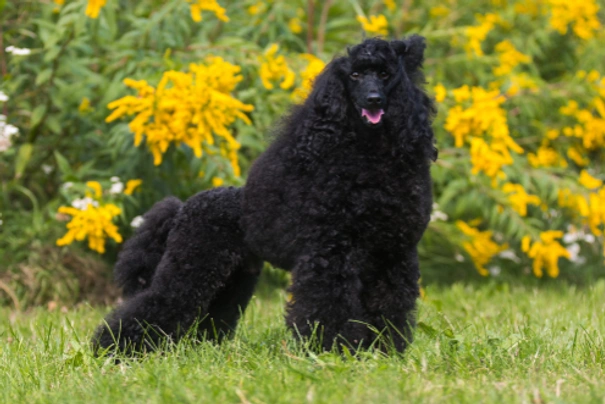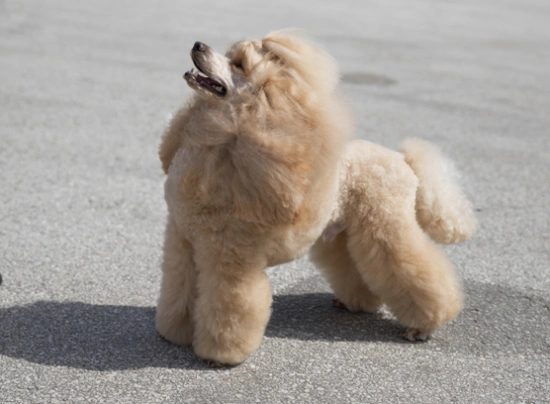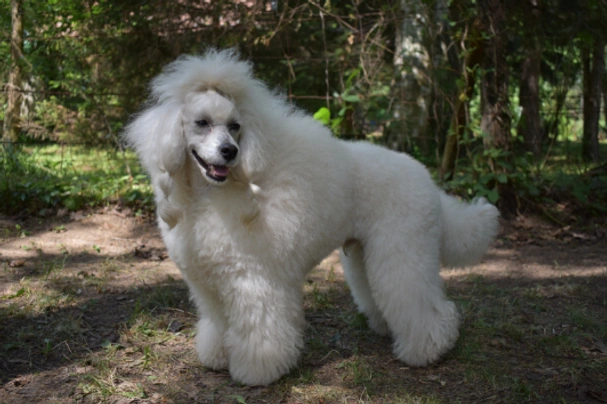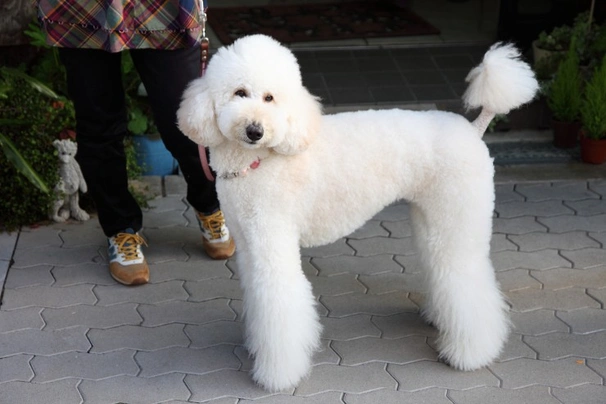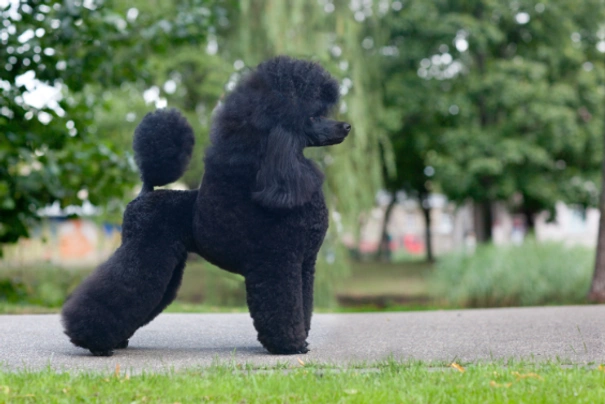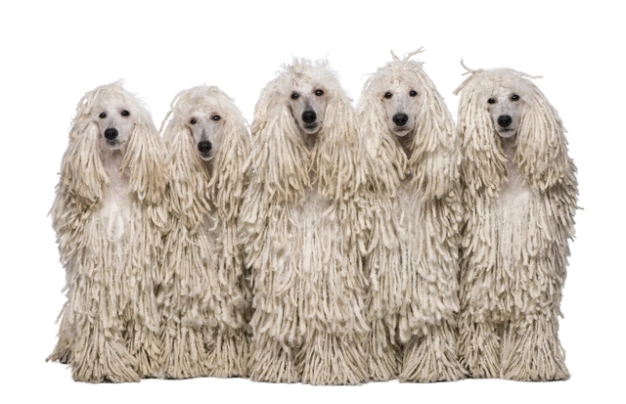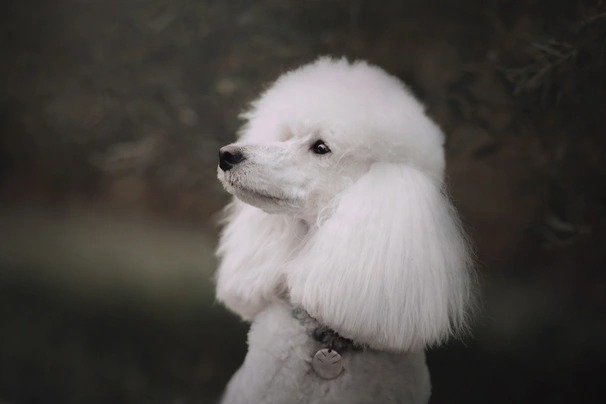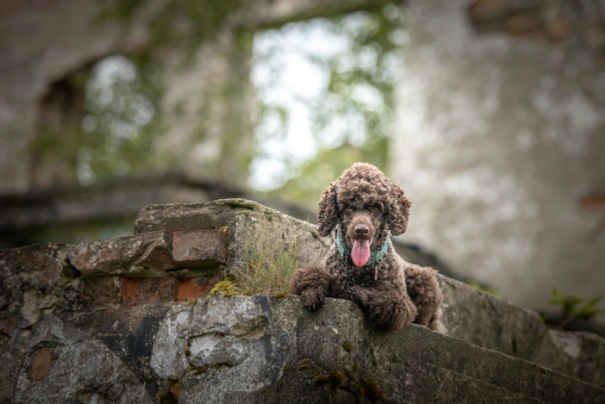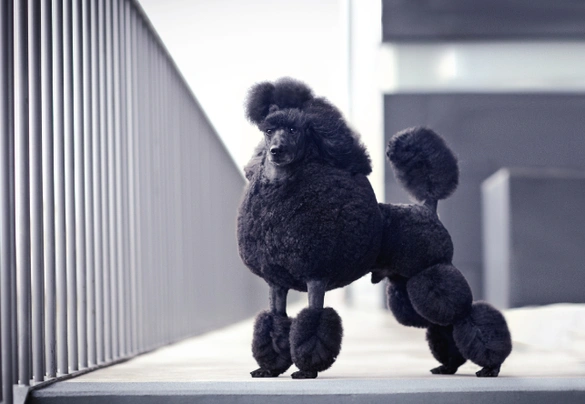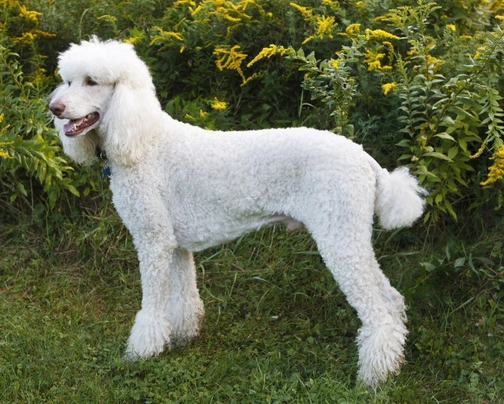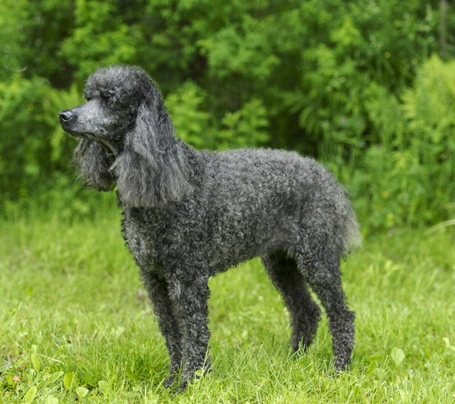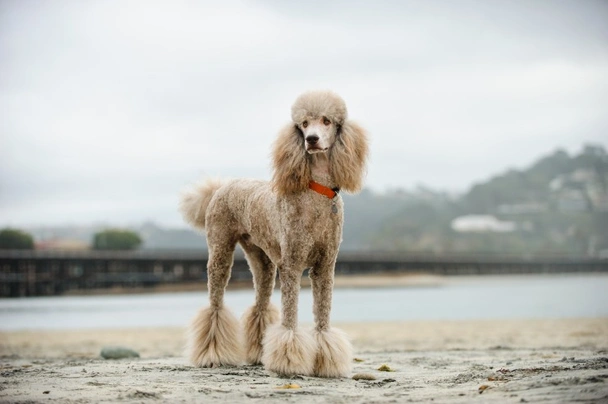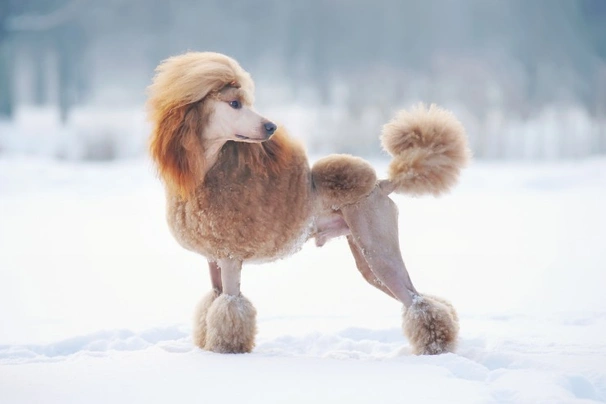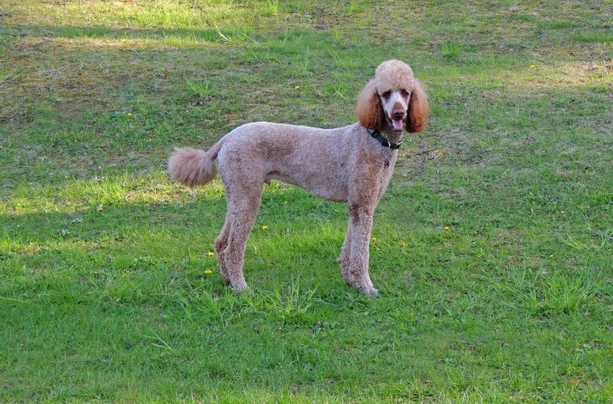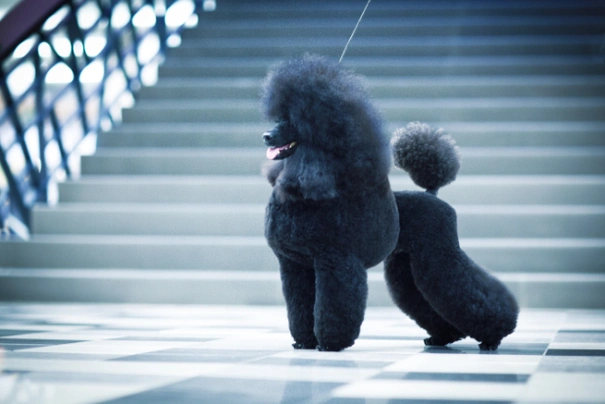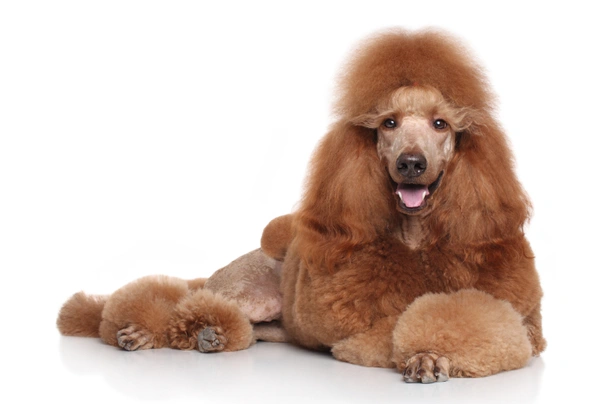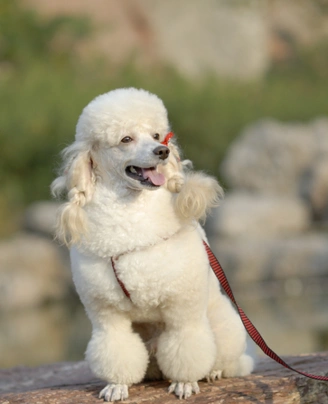Standard Poodle
Pros
Cons
Introduction of the Standard Poodle
Standard Poodles are the largest of their kind, recognised for their elegant appearance, extraordinary intelligence, and affectionate nature. Primarily bred as water retrievers, these dogs have transitioned seamlessly into beloved family companions, combining athleticism with remarkable trainability. Their lively, loyal disposition makes them excellent canine partners for active households that value a well-rounded, engaging pet.
Physically, Standard Poodles boast a sleek, muscular build characterised by a dense, curly coat that requires attentive grooming. Their temperament is gentle yet spirited—they are alert to their surroundings, forming strong social bonds without unnecessary aggression. This temperament, combined with their high intelligence, ensures they excel in diverse roles, from performance in dog sports to therapy and service work.
Ideal owners for Standard Poodles are those prepared for the commitment of daily exercise and mental stimulation. Families who enjoy outdoor activities or busy lifestyles will find these dogs perfectly suited to their needs. Additionally, owners who are experienced with intelligent, active breeds will appreciate the nuances of the Poodle’s personality and training requirements.
Caring for a Standard Poodle involves regular grooming to maintain their distinctive coat, consistent training from early puppyhood, and providing ample physical and mental exercise. Their adaptability allows them to live comfortably in spacious homes or well-managed apartments, as long as their activity needs are met. Their intelligence and eagerness to please make them delightful companions but also demanding of attention and structure.
Perfect For
Active families or individuals with time to engage in daily walks, play, and mental challenges. Experienced dog owners who appreciate high intelligence and a trainable nature. Homes with access to secure outdoor spaces to allow freedom of movement and play. Those seeking a combination of a capable working dog and affectionate family pet.
Key Considerations
Requires regular professional grooming every six to eight weeks to maintain coat health. Needs consistent mental and physical stimulation to avoid behavioural issues caused by boredom. Potential for separation anxiety if left alone for extended periods; they thrive when involved in family activities. Health considerations include screening for breed-specific diseases and managing weight through diet and exercise.
History of the Standard Poodle
The Standard Poodle traces its origins to Germany, with subsequent development shaped notably in France, where the breed was refined into the dog known today. Documented as far back as the 15th century, these versatile dogs were bred primarily as water retrievers, skilled in marshes and swamps, aiding hunters by retrieving waterfowl. Their exact beginnings are believed to be linked to herding dogs introduced to Europe from North Africa or Asia, with multiple theories suggesting a complex ancestry involving the Berber tribes and the Germanic Goths.
Standard Poodles have been depicted in European art and literature since the 16th century, highlighted by works from Albrecht Durer in Germany and Goya in Spain, reflecting their status and popularity among the elite. Their intelligence, combined with their distinctive curly coat, made them favourites for use in aristocratic courts as well as functional hunting companions.
Early Development
During the 1800s, the breed contributed genetics to other breeds such as the Curly-coated Retriever, the Pudelpointer (from crosses with the English Pointer), and the Irish Water Spaniel. The breed's role as a skilled hunting retriever was well established, especially in wetland environments, but it also became increasingly popular as a companion dog.
Modern Recognition
Recognised officially by the Kennel Club, the Standard Poodle maintains a strong presence in the UK and worldwide, thriving both as a show dog and a versatile family and working dog. Their rich history, coupled with their enduring popularity, ensures that they are a staple in canine competitions and beloved household companions to this day.
Appearance of the Standard Poodle
Size and Build
Standard Poodles stand over 38 cm at the withers, with males typically measuring between 56 and 61 cm tall and females between 51 and 56 cm tall. Males generally weigh between 29 and 34 kg, while females weigh slightly less, ranging from 25 to 29 kg. Their build is well-balanced and athletic, with a strong muscular frame complemented by well-laid back shoulders and straight, muscular legs. The body is proportionate with a deep, wide chest and well-sprung ribs, a short, slightly curved back, and broad, well-muscled loins.
Coat and Colours
Their thick, dense coat consists of curly hair rather than fur, which is harsh to the touch and dense enough to provide protection against cold and wet conditions. Accepted coat colours encompass a spectrum of solid shades including apricot, black, blue, brown, cream, red, silver, and white. Standard Poodle coats are often clipped in traditional styles, especially in the show ring, to highlight the dog’s elegant conformation.
Distinctive Features
The head is long and refined with a slight peak and a moderate stop. Poodles have dark, almond-shaped eyes that convey alertness and intelligence. Their ears are low-set and lie close to the head, featuring long, broad leathers. The strong jaw sports a perfect scissor bite. Their tail is thick at the root and carried straight and away from the body, complementing a flowing gait marked by free-moving, light, and driven strides.
Gender Differences
Males are generally larger and more robust, with a more pronounced muscular presence, while females tend to be slightly smaller but equally elegant and athletic. Behaviourally, males may exhibit more dominant tendencies, requiring consistent training, whereas females often demonstrate a slightly calmer but equally spirited temperament. The breed standard, as set by the Kennel Club, guides all evaluations of these physical and temperamental traits in the show ring.
Temperament of the Standard Poodle
Core Personality Traits
The Standard Poodle is renowned for its high intelligence, ranking 2nd out of 79 breeds in canine intelligence studies. They are eager to please, highly sensitive to vocal cues, and thrive on structured training, making them exceptionally trainable. Their playful, energetic spirit endears them to families and active owners alike, preserving a puppy-like zest well into older age.
Social Behaviour
Typically friendly and social, Standard Poodles interact well with strangers and other pets when properly socialised. Though alert and quick to bark to notify their owners of unusual activity, they are seldom aggressive. Their natural watchdog instincts provide effective home guardianship without undue hostility. Their adaptable nature allows them to live comfortably in various household environments, from busy family homes to quieter adult-only dwellings.
Working Instincts
Bred as retrievers, they retain strong working drives including a love of water, quick responsiveness, and endurance for active tasks. Their intellect and agility make them excellent candidates for canine sports such as agility, obedience, and flyball. While their prey drive has diminished over time due to selective breeding emphasizing companion traits, they remain alert and engaged hunters at heart.
Common Behavioural Challenges
Without adequate physical and mental stimulation, Standard Poodles can develop destructive behaviours born from boredom and anxiety. They also have a predisposition to separation anxiety if isolated for extended periods. Early, consistent training and socialisation are critical to fostering balanced, confident dogs. Excessive barking can be managed effectively through positive reinforcement and appropriate boundaries set during puppyhood.
Intelligence / Trainability of the Standard Poodle
Standard Poodles are widely acknowledged for their exceptional trainability, owing to their intelligence and eagerness to please. This combination makes them one of the easiest breeds to train, excelling in obedience and performance sports. Their sensitivity to human tone and cues enhances the one-on-one training bond, leading to rapid progress when handled consistently and positively.
Puppy Training Priorities
Training should commence from the first day a puppy enters the home. Essential priorities include establishing the dog's place in the family hierarchy to prevent dominance issues and extensive socialisation. Introducing puppies to various environments, people, animals, and stimuli lays the foundation for well-rounded adult behaviour. Early focus on commands such as come, sit, stay, quiet, leave it, down, and bed is vital.
Training Methods That Work
Positive reinforcement strategies suit Standard Poodles best, leveraging their desire to please. Clear, consistent commands with varied reward-based systems—such as treats, play, or praise—yield excellent results. Incorporating mental challenges keeps their intelligence engaged, reducing the likelihood of undesirable behaviours. Trainers should avoid harsh methods which may damage the dog’s sensitive nature.
Advanced Training Potential
Standard Poodles shine in advanced activities like agility, obedience trials, and flyball, benefiting from their athleticism and cognitive skills. They are also suitable for therapy work, guide dog roles, and other assistance tasks. Structured training regimes that include progressive challenges ensure long-term engagement and satisfaction for both dog and owner.
Common Training Mistakes
A frequent pitfall is spoiling puppies due to their cuteness, leading to lack of discipline and boundary recognition. Ignoring early socialisation risks future behavioural problems such as shyness or aggression. Additionally, failing to provide sufficient mental and physical stimulation can cause restlessness. Owners must remain patient, consistent, and proactive in training efforts, especially during the first six months.
Children and other
Age-Specific Interactions
Standard Poodles are generally excellent with children, showing tolerance and a playful nature. However, their large size requires careful supervision around toddlers and small children to prevent accidental knocks. Older children and teenagers benefit from the dog’s interactive and energetic character, making the Standard Poodle a family favourite as they grow.
Teaching Children Proper Interaction
It is crucial to teach children how to approach and handle dogs gently and respectfully. Rules such as not disturbing a resting dog, avoiding rough play, and recognising when the dog needs space help maintain harmonious relationships. Supervised introductions and encouraging calm behaviour around the dog ensure safety for all.
Breed-Specific Considerations
The Standard Poodle’s energy and size mean they thrive in homes where children understand the need for structured interaction. Their playfulness suits active families, but care must be taken to manage exuberance, especially in young puppies or elderly dogs. Gentle grooming sessions can also be used as bonding opportunities under adult supervision.
Creating Safe Environments
Adult supervision is essential during all child-dog interactions to prevent accidental harm or stress. Providing the dog with a quiet retreat area ensures they have a safe space to decompress when needed. Educating the whole family on canine body language enhances mutual understanding and prevents conflict.
Health of the Standard Poodle
Breed-Specific Health Conditions
Standard Poodles have a lifespan averaging between 12 to 14 years when well cared for. However, like many breeds, they are susceptible to certain hereditary and acquired health issues. Common concerns include Addison's Disease (hypoadrenocorticism), bloat (gastric torsion), liver shunt, lobular dissecting hepatitis, juvenile renal disease, autoimmune diseases, epilepsy, Cushing's disease, squamous cell digital cancer, neonatal encephalopathy, and atrial septal defects.
Dermatological issues, notably sebaceous adenitis, affect the sebaceous glands and can result in hair loss and skin infections. Melanomas, particularly in black-coated individuals, pose a cancer risk in skin, nails, mouth, and eye tissues. Eye problems such as iris atrophy and progressive retinal atrophy are also present, with screening recommended.
Genetic Testing Requirements
Health screening schemes available include BVA/KC Hip Dysplasia evaluations, BVA/KC/ISDS Eye Scheme tests, Breed Club tests for sebaceous adenitis, DNA screening for von Willebrand's Disease (vWD type 1), and neonatal encephalopathy tests for breeding pairs. Responsible breeders adhere to these to minimise health risks.
Preventive Healthcare Schedule
Vaccinations typically start between 10-12 weeks of age with a booster schedule advised by vets based on current guidelines. Neutering and spaying recommendations vary but generally occur between 6 to 12 months of age. Continual health checks and parasite control contribute to longevity and quality of life.
Insurance Considerations
Insurance premiums reflect breed-specific health predispositions and vary by location, age, and coverage type. Common claims include treatment for bloat, Addison’s disease, and skin conditions. Prospective owners are advised to select comprehensive policies that cover hereditary conditions and specialist treatments.
Caring for the Standard Poodle
Maintaining a Standard Poodle involves a commitment to regular grooming, exercise, and proper nutrition. Their dense, curly coat requires routine maintenance to prevent matting and skin problems, while daily activity supports their athletic build and energetic temperament. Feeding high-quality diets appropriate to their life stage optimises health and vitality throughout their lives.
Daily Care Routine
A typical day begins with a brisk walk or play session to expend energy, followed by feeding with balanced meals according to age and activity. Grooming attention can be given daily or weekly depending on coat condition, including brushing and ear checks. Mental stimulation via training or puzzle toys helps prevent boredom, essential to well-being.
Living Environment Needs
Though adaptable to apartment living if adequately exercised, Standard Poodles thrive best in homes with secure gardens or access to open spaces. They benefit from moderate climates but care should be taken in extreme temperatures to protect their skin and overall health.
Seasonal Care Adjustments
In summer, protection against heatstroke and skin care is important; in winter, their water-resistant coat offers some natural insulation but additional warmth and moisture management may be needed. Regular ear cleaning helps prevent infections, especially in humid conditions.
Senior Care Adaptations
As Standard Poodles age, their exercise should be moderated to suit diminished stamina and joint health. Dietary adjustments to maintain ideal weight, arthritis management, and regular vet check-ups are critical. Providing comfortable bedding and gentle grooming keeps senior dogs comfortable and stress-free.
Grooming of the Standard Poodle
Standard Poodles require high maintenance grooming that should ideally be performed professionally every six to eight weeks. Their unique curly, hair-like coat does not shed, reducing allergens but demanding consistent care to avoid mats and skin problems. Professional grooming includes cutting, shaping, and delicate ear hair plucking to promote ear health and prevent infections.
Coat Maintenance Schedule
Owners should brush their Poodle's coat daily to prevent tangles, using slicker brushes and grooming gloves designed for curly coats. Weekly checks on the skin and ears help detect potential issues early. Monthly baths with dog-specific shampoos keep the coat clean and hydrated.
Professional Grooming Requirements
Regular visits to experienced groomers ensure the dog’s coat is clipped according to breed standards, especially for show dogs. Ear plucking, nail clipping, and dental care are usually part of the grooming sessions to maintain overall health.
Home Grooming Techniques
Between professional appointments, owners can maintain coat health by grooming at home with appropriate tools, focusing on gentle brushing and spot cleaning. Instruction from a professional groomer is recommended to master these techniques safely.
Common Grooming Challenges
Poodles are prone to matting if grooming is neglected, which can lead to painful skin conditions. Sensitive skin requires hypoallergenic and gentle products. Seasonal changes may increase shedding of dead skin cells, necessitating extra grooming vigilance.
Exercise of the Standard Poodle
Standard Poodles are active dogs requiring at least an hour of vigorous exercise daily, with additional opportunities to run and play in secure outdoor spaces highly beneficial. Their intelligence demands mental as well as physical activity to keep them balanced and content.
Daily Exercise Requirements
Minimum daily exercise includes brisk walks, interactive play sessions, and training exercises to expend energy and engage their minds. Puppies require shorter sessions tailored to growth stages.
Suitable Activities
The breed thrives in dog sports like agility, obedience competitions, and flyball, which combine physical challenge with mental stimulation. Swimming is an excellent activity reflecting their historical water-retrieving role.
Exercise Restrictions
Young puppies should have limited high-impact exercise to protect developing joints. Caution is required in extreme weather to avoid overheating or cold stress, with adjustments to exercise times and intensity accordingly.
Mental Stimulation Ideas
Food puzzles, scent games, and trick training sessions provide engaging mental workouts. Rotating toys and structured play prevent boredom and associated behavioural issues.
Feeding of the Standard Poodle
Nutritional Requirements
Standard Poodles benefit from high-quality, balanced diets tailored to their size, activity, and age. Protein levels between 18-25% and fat levels around 10-15% support muscle maintenance and energy needs. Caloric intake should be adjusted to prevent obesity, notably in neutered or less active dogs.
Feeding Schedule Guidelines
Puppies are fed three to four small meals daily, gradually transitioning to two meals per day in adulthood. Feeding routines should avoid large meals immediately before or after exercise to reduce bloat risk.
Special Dietary Considerations
Some Standard Poodles may develop skin allergies or sensitivities requiring hypoallergenic or novel protein diets. Supplements such as omega fatty acids may improve coat and skin health. Owners should monitor for food intolerances and consult vets for tailored advice.
Weight Management
Maintaining an ideal body condition through measured feeding and regular exercise is crucial. Owners should monitor weight closely and adjust portion sizes to prevent obesity-related health problems common to the breed.
Standard Poodle price
If you are looking to buy a Standard Poodle, prices typically range from £700 to £1,500 depending on the breeder and the dog's pedigree quality. Licensed breeders often command prices toward the higher end of this spectrum due to comprehensive health testing and breed standard conformity, while individual breeders may offer slightly lower rates.
Initial setup costs include essentials such as quality grooming tools, toys, bedding, and puppy-proofing the home, which can total around £200-£400. Monthly expenses average between £80 and £120, covering premium food, regular grooming appointments, insurance, and routine veterinary care.
Insurance costs vary significantly based on location and coverage level; for example, basic cover can cost approximately £22 per month, while lifetime policies may rise to around £47 monthly. Potential health issues like Addison’s disease or bloat underline the importance of choosing insurance that covers hereditary conditions and emergency treatments.
Overall, the lifetime cost of owning a Standard Poodle can be substantial, factoring in grooming, veterinary visits, food, and training. Prospective owners should budget prudently to provide a quality life for their dog. You can find Standard Poodle for sale on Pets4Homes to explore current listings and connect with reputable breeders.
Buying advice
Purchasing a Standard Poodle involves careful consideration and due diligence, especially given the breed's popularity and the potential for unethical breeding. Prospective buyers should seek breeders who prioritise health, temperament, and breed standards.
Finding Ethical Breeders
Look for breeders registered with the Kennel Club Assured Breeder Scheme, ensuring adherence to responsible breeding practices. Visit the breeder's premises to observe living conditions and meet the puppy’s parents. Ask detailed questions about health testing, socialisation, and the puppy's early care regime.
Health Testing Verification
Request documentation for health screenings, including BVA/KC Hip Dysplasia and Eye Scheme certificates, as well as tests for sebaceous adenitis and von Willebrand's Disease (vWD). Verified health clearances reduce the risk of inherited conditions.
Puppy Selection Process
Evaluate puppies for temperament, alertness, and social skills. Responsible breeders will facilitate interactions and provide guidance on suitable companion matches. Check for clear eyes, clean ears, and appropriate weight for age.
Contract and Guarantee Review
Ensure contracts include return policies, health guarantees, and microchipping information. Beware of red flags such as pressure to purchase unseen puppies or unusually low prices indicating possible scams.
Rescue and Adoption Options
Consider adopting from recognised Standard Poodle rescues, where adult dogs requiring new homes are available. Adoption can offer a rewarding alternative while providing a dog with a second chance.
You can find Standard Poodle for sale on Pets4Homes to start your search for a healthy, ethical puppy or rescue.
